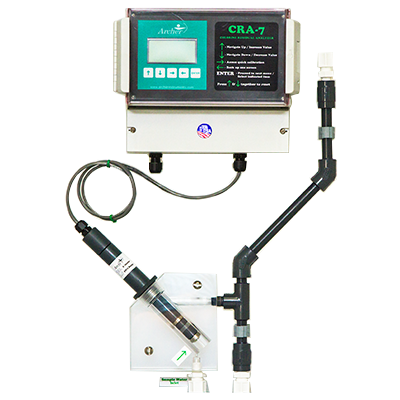The Archer Instruments GLD30 Gas Leak Detector is a fixed-installation ambient air monitor that continuously senses the atmosphere for the presence of leaking gas.
This device is used to alert operators and plant personnel in the event of Chlorine gas, Sulfur Dioxide gas, or other gaseous chemical leaks. With an Archer Instruments chlorine gas sensor installed near your chlorine cylinders and a properly integrated GLD30 controller, operators and other plant personnel can be assured of automatic notification in the event of a chemical leak. Each GLD30 controller is capable of monitoring up to 4 sensors. These sensors can be for the same or different gases (any combination).
The CRA-7 Chlorine Residual Analyzer is an amperometric “probe-style” chlorine analyzer. The CRA-7 accommodates one or two chlorine sensors with each controller. Multiple sensors will allow for the measurement of either Free, or Total Chlorine. The CRA-7 also has an optional pH sensor configuration. This allows for continuous monitoring of pH levels as well as, (if desired) mathematical compensation for the effects of fluctuating pH levels on Free Chlorine measurement. The Free Chlorine sensor used on the CRA7 operates with reduced pH dependence. Modest changes in the sample water pH value, will have little impact on the Free Chlorine measurement with this sensor.
In most applications, the CRA7 Free Chlorine sensor renders it unnecessary to be concerned about the dissociation of Free Chlorine molecules. Archer Instruments offers many accessory products in addition to the products already described.
These products include:
- secondary vacuum line check valves
- corporation stops and injection quills (for injecting chemical solutions into process lines)
- universal ton container adapters
- gas pressure manifolds
- isolation valve assemblies
- manifold unions
- drip leg heaters
- flexible connectors




